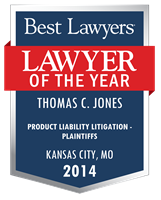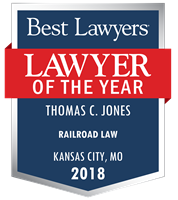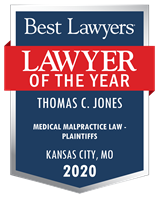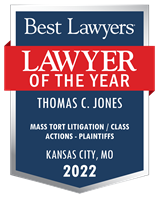Thomas C. Jones
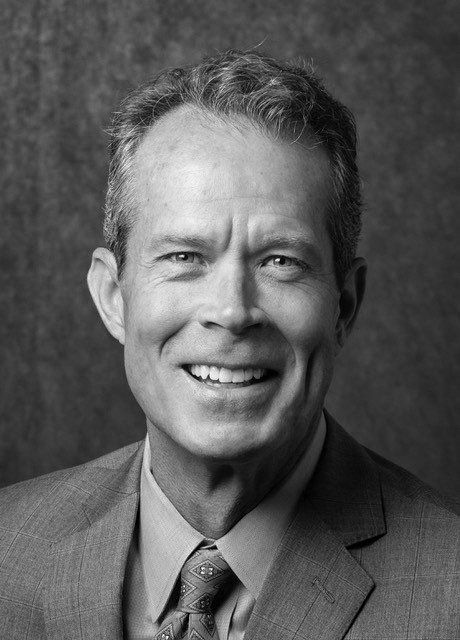
Coming from a family of lawyers, Tom Jones came by his love of the law honestly. But his desire to help people undergoing their biggest life challenges focused his direction to plaintiffs law.
Tom graduated from the University of Missouri-Columbia in 1985 before attending law school at the University of Missouri – Kansas City and graduating in 1988.
Tom concentrated his practice on railroad-related ligation, and in 1997 he won the largest railroad case settlement in the country for its time. This innovative case approach became a launchpad for this kind of litigation, setting a precedent for cases going forward and focusing Tom’s career more acutely on railroad injury work.
In 2001, Jones founded DBJ with his partners Scott S. Bethune and Grant L. Davis. The three men share a strong friendship and an even stronger work philosophy: to fight tirelessly for each and every client and help people who need them.
If Tom isn’t working hard at DBJ, you can find him spending time with his wife, Susan, and their kids, Henry and Ellie.
Though not exclusive to railroad litigation, Tom has concentrated much of his practice on fighting the rail industry’s titans on public safety issues. He and DBJ receive calls from lawyers across the country wanting to gain knowledge about “train” cases and are often sought to co-counsel on cases. He regularly speaks and teaches other lawyers nationally on trial issues related to rail litigation.
Having Kansas City, the nation’s second-largest rail hub, as home, Tom has the knowledge and experience, and together with the firm, has resources to take on the largest railroads in the U.S. Tom regularly litigates cases against all of the major Class 1 railroads (Union Pacific, BNSF, Norfolk Southern, CSX, Kansas City Southern and Canadian National) in Texas, Arkansas, Oklahoma, Missouri, Illinois, Iowa, North Dakota, Ohio, West Virginia, Missouri, Kansas, and other states. Cases against the U.S. rail industry are fraught with complex legal issues, are against highly organized and well-financed adversaries, and require a great amount of expertise even to have a chance of success. The rail industry has affirmatively chosen to pay its lawyers to fight in a scorched-earth manner instead of doing the simple things for public safety like:
— Putting flashing lights/automatic gates signal systems at its crossings that need them;
— Sounding a proper horn always and without fail;
— Removing trees and vegetation that block the view of oncoming trains
— Maintaining its tracks
— Operating its trains at safe speeds to avoid derailments.
Tom gained acclaim for trying a nationally renowned case to a jury verdict that resulted in the largest grade-crossing collision verdict in American trial history, $160,000,000. This verdict helped change how the railroad industry looks at its most dangerous crossings.
Tom also led the charge in Arkansas’ largest rail crossing case settlement of $12.5M in a case involving a crossing with a very dangerous history of over twenty-five (25) prior wrecks.
The forces involved in train collisions are immense and have been likened to a fully loaded tractor-trailer running over an empty Coke can. As a result, the unfortunate victims inside the vehicle are confronted with forces that often result in debilitating brain injury. As a result of litigating numerous train collision cases, Tom has vast experience in helping brain-injured adults and children.
In addition to representing those injured by negligent rail companies, Tom represents train operators in railroad employee job injury (FELA) cases.
Tom’s trial work has not been exclusive to battling the rail industry over public safety issues. A select few other successes include:
Tom representing the surviving family of an Army reservist killed in a helicopter collision with dangerously hidden overhead power lines, which resulted in two jury trials and over $30M collected from a $21M verdict, plus interest;
Tom representing a teenage boy injured when Arkansas’ largest children’s hospital operated on the wrong side of the brain, removing critical tissue, resulting in a $20M verdict; and
Tom helping represent Abengoa Bioenergy, an ethanol company, in its trial against Chicago Title Insurance Company for botching a zoning application and costing the Spanish biofuels company plans for a $200 million ethanol plant near Wichita, Kansas. The trial resulted in a $48M verdict for Abengoa Bioenergy. This verdict was collected on, with interest added, after an unsuccessful appeal by Chicago Title.
Kansas City Business Journal – Best of the Bar
Best Lawyers in America – Lawyer of the Year
Kansas City Metropolitan Bar Association Sustaining Member
Missouri Association of Trial Attorneys Board of Governors
American Association for Justice – Past National Chair, Railroad Litigation Section; Board of Governors, Traumatic Brain Injuries
National Trial Lawyers Board of Governors
